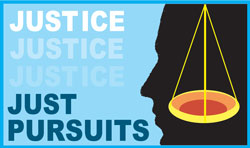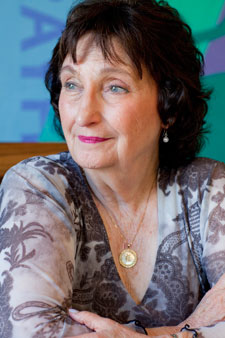Bronston masters all that jazz
 Editor’s note: Many California attorneys make a difference in their communities by representing individual vulnerable clients, for free, on critical legal problems. Some, however, have found other unique ways to fulfill their obligation to public service. The California Bar Journal is highlighting some of those "just pursuits" in this occasional series. To nominate an attorney, email cbj@calbar.ca.gov.
Editor’s note: Many California attorneys make a difference in their communities by representing individual vulnerable clients, for free, on critical legal problems. Some, however, have found other unique ways to fulfill their obligation to public service. The California Bar Journal is highlighting some of those "just pursuits" in this occasional series. To nominate an attorney, email cbj@calbar.ca.gov.
Edythe Bronston was smitten by jazz in high school after a young man invited her to see American bandleader and trumpeter Ray Anthony, and she asked, “Who’s that?” She soon left her hometown of Allentown, Pa. for Los Angeles, then worked as a bill collector while putting herself through undergraduate school before entering law school full time.
Now in private practice as a court-appointed receiver, the former Cox, Castle & Nicholson partner doesn’t need to ask anymore who many of the jazz musicians are. She knows. She’s also familiar with their struggles for meager pay, no benefits and not enough gigs to go around. A supporter of the Jazz Foundation of America, a New York-based nonprofit that provides musicians with emergency funds and free or low-cost medical care, Bronston tried to start a West Coast branch. When that failed, she gathered a bunch of like-minded jazz lovers around her dining room table and founded California Jazz Foundation. Since beginning seven years ago, the group has helped 121 jazz musicians in need.
What gave you the idea to start California Jazz Foundation?
 |
Bronston |
I knew a lot of jazz musicians, and I knew a lot who were suffering. I learned how little much of them made. A lot of them, if they’re lucky enough to have a regular gig once a week, get $60 a night for playing three sets, unless they’re the leader in which case they get $70. It’s just outrageous. As long as they’re able to play, they don’t consider a time when they won’t be able to play. Most have significant others who generally have good jobs and benefits. Well, p.s., they’re getting older, and in this economy they’re getting laid off. And nobody can afford COBRA. Most musicians don’t get Social Security because they haven’t paid into it. Even if they have help with their medical bills, it doesn’t pay their rent. It doesn’t put food on their table. The more I learned, the more appalled I was.
Then I heard tales that people had tried to start something with the union years ago, and that didn’t work out. I said, “OK, I can do this.” I’m really good at starting things. I know a lot of people. I’m very focused. I’m very linear. I’m not creative, but I get things done.
Had you started a nonprofit before?
Never. I didn’t know the first thing. I have a CPA, Dominic LoBuglio, with whom I’ve worked for years in my business who likes jazz but doesn’t know a lot about it. I called him up and said, “Will you help me? I want to do this” And he said, “Sure.” He’d been the treasurer of Stop Cancer, so he had more background than I did. We kind of muddled through together and got it done.
What were some of the challenges?
We had no money, not a dime. One of the first people we helped was in San Francisco. He was a really good local musician who worked a lot. He was in his 70s and he’d had successful back surgery, but he couldn’t work for two months. And he couldn’t pay the rent and put food on the table. We passed the hat.
We filed for tax-exempt status but we couldn’t get it in time. We were so naïve. Fools rush in. We wanted to have an event so we could get some money. Well, you can’t have an event if you’re not tax exempt. But when you finally get your tax exemption, it relates back to the time of the entity’s incorporation. But it was very scary trying to get people to help when you don’t have your tax-exempt status yet, and it takes a long time unless you know someone. I knew no one. I wrote to senators Feinstein and Boxer and asked for their help in expediting our application. They tried. But go fight the IRS. There’s no pushing them. So, it took 11 months.
Where do you get your funding?
We’re hand to mouth. We’re a membership organization. We now have 470 members. The Herb Alpert Foundation has been very kind to us. They’ve helped us for five years. We get sponsors, we get donors, we have events. [Artist] LeRoy Neiman gave us a benefit in February 2008 at the Skirball, just when everything in the economy came crashing down. I got a $50,000 loan secured by my house for seed money, just to get us through. Boy, I was sweating blood.
And we have very low overhead because we work out of my house. I have my board meetings here. We have 15 on the board of directors and an advisory board. Our only regular expense is our part-time administrator and our social worker, who works by the project. Whenever anybody applies for help, she’ll get an application to them, do due diligence and counsel applicants.
How do musicians learn about you?
KJAZZ, which is the only jazz station here, does [public service announcements] for us whenever we’re doing something. People write articles. We put brochures in all the clubs. We have an ad in the Local 47 members handbook. I’m always telling the guys on my board, “You’ve got to keep talking because when you’re standing in line you don’t know who might be standing in front of you or behind you.”
Once, I was in my favorite Indian restaurant, and across the way someone’s cell phone rang, and it was a Thelonious Monk ringtone. So, I got up and walked over. It was a young couple. It’s unusual for young people to like Thelonious Monk and Charlie Parker. I said, “You guys like jazz?” It turns out he was a jazz musician and she was a dancer. So we got two new members.
Describe one of the memorable stories that comes to mind of someone the foundation has helped.
One of our board members is Greg Porée, a wonderful guitarist. He sent somebody to us who needed help. I never heard of him because there are so many musicians who do studio work, and you never know their names. But we were in Vibrato [a Los Angeles jazz club] one night because Greg and his trio were playing, and this tall, good looking, hair-in-dreadlocks guy, plays bass so beautifully you could weep, came over with a glass of wine at intermission. He said, “I just wanted to meet you and shake your hand and say, ‘thank you.’” I said, “Do I know you?”
Then he told me who he was, and I realized this was a guy who had an accident and hurt his hand and had to have surgery and he plays the bass. The surgery was successful, but every night he would come home from playing―he has a wife and a child―and his hand would be bleeding. His wife would say, “Honey, you’ve got to stop, take a break, because your hand is never going to heal.” And he said, “Who’s going to put food on the table and pay the rent if I don’t work?” Greg told him about us. He applied and we helped him. His hand is now perfect, and he plays all the time.
As founder and president, how much time would you say you devote to the foundation?
I put in at least 20 hours a week, which is a lot because I’ve got a full practice.
What’s the reaction of your friends and colleagues when they learn about what you’re doing?
So many of them love jazz. So many lawyers love jazz. So many doctors love jazz. It’s great.
The most amazing thing happened last week. I was on a conference call with a bunch of lawyers and my accountant, and my cell phone rang. My ringtone is Charlie Parker playing “What’s New.” And one of the lawyers said, “Who’s into jazz?” And I said, “I am.” He said, “I love jazz. As a matter of fact, I was at Catalina’s last night. My son was playing in the Young Artists series.” And I said, “Well, my friend is the producer of the Young Artists series.” We started talking. By the time I hung up, we had three new members.
Where do you see the foundation going in the future?
We’re growing by leaps and bounds. Because we have such low overhead, we have a structure in place which would allow us ―if we had more money―to handle 17 times the [number of cases]. The only expense that would increase would be our social worker’s cost for her time. We’re always looking for more members and supporters so we can give back to those artists who have given us so much of themselves, often with so little reward.
I’m very passionate about it. People just don’t realize that it’s our only indigenous music, and it’s not supported.
Susan McRae, a Los Angeles-based freelance writer, interviewed Bronston. This is an edited version of their conversation.